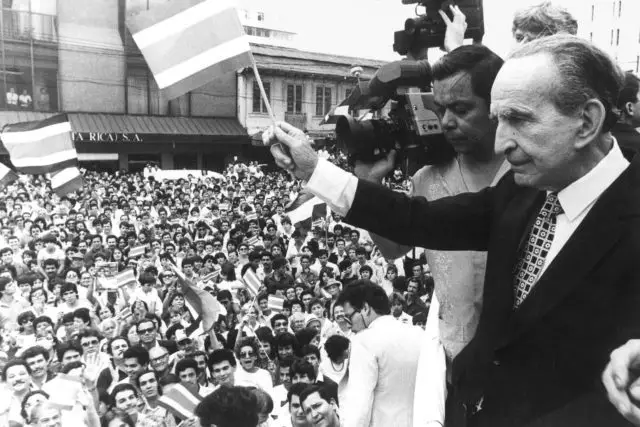It refers to the elimination of the armed forces of Costa Rica, carried out on December 1st, 1948, after the end of the Costa Rican civil war of 1948.
Since the abolition of the army, the country has only required military forces on 2 occasions; the 1st time, in 1955, to prevent an invasion from Nicaragua by expatriates with the support of the Somozista government. And the 2nd time, in 1965, when it sent 21 policemen as part of the Inter-American Peace Force of the Organization of the American States (OAS) during the United States occupation of the Dominican Republic.
Every December 1st, Costa Rica celebrates one of the most important milestones of its civilian life in the search and achievement of peace and democracy: the abolition of the Army as a permanent institution.
That very same date, in 1948, General Figueres, once victorious in the civil war, dissolved the Army of Costa Rica. In an emotional ceremony held in what is now the National Museum, in which there were witnesses, students, members of the diplomatic corps and national figures, the president of the governing junta, José Figueres Ferrer, symbolically demolished part of the stone walls of the Bellavista barracks. Marking in this way the end of the military era, and the beginning of another one in which civil security and education would be the priorities of the government.

In 1949, the Constituent National Assembly elevated the presidential mandate of December 1st to constitutional status, thus sealing the civil will of the people, after a series of events that brought mourning and pain to many Costa Rican families. And thus, in order that the youth and all citizens, in general, had always present that heroic act. By decree of December 24th, 1986, it was declared that every December 1st is the “Day of the Abolition of the Army”
The Ministry of Public Education was officially instructed to issue guidelines for the annual celebration of this event in all the educational centers of the country, in order that the act of that December 1st would become part of the long-term memory of all the people in the nation.
It is important to mention that the traditional function of armies has been to protect national sovereignty against possible threats of internal and external order. However, little by little, the army ceased to make sense in Costa Rica. This can be reflected in the development of education as a way of generating consensual values, and the existence of a state abided by a set of laws. Their application, thus contributing to the acceptance of the republican foundations and institutions by the people, led to a truly peaceful democracy.

Costa Rica entrusted its national security to the inter-American treaties of joint defense and international tribunals to resolve conflicts. Likewise, the absence of an army is beneficial because it favors institutional and political stability, without the danger of military intervention or coups d’état. In this way, it generates greater economic resources for education, health, and other social programs, aside from contributing to creating a civilizing and pacifist mentality in the population, which must be transmitted to all aspects of daily life, whether in family or communities.
The real fight against violence and in favor of dialogue is carried out in the classrooms, by instructing children to love peace and understanding and being capable to resolve conflicts with a respectful attitude of others’ rights. It is fought by empowering youth through access to a quality education, which will open the opportunities to get a better standard of life as well as promising projects. It is also waged with social policies that promote equity and justice. These premises avoid the construction of polarized societies between those who have everything, and those who have almost nothing. The odious inequality of opportunities only generates, as a consequence, suffering, pain, resentment, and violence.
Today, Costa Rica faces great challenges; a growing inequality, violence, the impact of drug trafficking and its trails of death and destruction. That is why all people -boys and girls, young people, adults, and seniors- must know and value history. This can be achieved by knowing in depth what to live in a brave country that abolishes the army and opted for the pacifist democratic way means.
Moreover, the world must know the reasons that led to the elimination of the army; to dispense without an institution that does not cease to be a symbol of repression and privileges. A deep tradition of our people to carry on their democracy and political culture in dialog, negotiation, understanding, rather than imposing force as a way of living.

